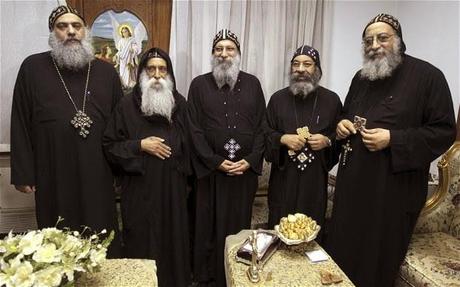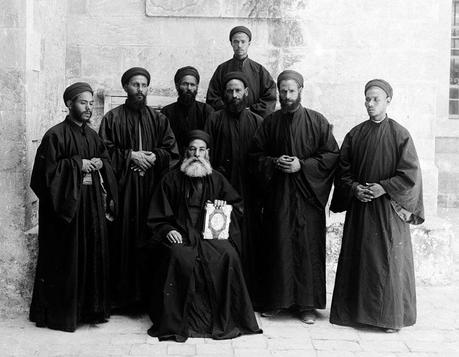Foxe's Book of Martyrs- According to this summary from Christian Book Summaries,
Writing in the mid-1500s, John Foxe was living in the midst of intense religious persecution at the hands of the dominant Roman Catholic Church. In graphic detail, he offers accounts of Christians being martyred for their belief in Jesus Christ, describing how God gave them extraordinary courage and stamina to endure unthinkable torture.From the same link, the book's purpose was fourfold:
- Showcase the courage of true believers who have willingly taken a stand for Jesus Christ throughout the ages, even if it meant death,
- Demonstrate the grace of God in the lives of those martyred for their faith,
- Expose the ruthlessness of religious and political leaders as they sought to suppress those with differing beliefs,
- Celebrate the courage of those who risked their lives to translate the Bible into the common language of the people.
~~~~~~~~~~~~~~~~~~~~In the last posting, last February 2014, I looked at the ten primitive persecutions. Foxe developed his chronicle in chapters from the first martyr, Stephen, in chapter 1: "History of Christian Martyrs to the First General Persecutions Under Nero" and in February we got to the end of chapter 2: "The Ten Primitive Persecutions". That brought us up to 303AD.
~~~~~~~~~~~~~~~~~~~~
Last February was the last Martyr Moment I'd published. I'd wanted to cover only the first ten primitive persecutions, because once you get into the 300s AD, Catholic martyrs are mixed in and it becomes too hard to separate fact from mystical Catholic fiction, at least it was for me.
The first ten persecutions covers well the tribulations the early Christians went through. I listened to a recent sermon from John MacArthur. On Sunday nights he is going through the book of Acts. The sermon is called "Persecuted for Truth's Sake" and it covers Acts 4:1-12. (There is no transcript yet, but there will be). He mentioned the persecutions, the first ten, and generalized some of the more heinous acts. It is always worthwhile to remember what the early Christians did, they were bold in proclaiming Christ to a hostile system, which at that early time was the Jews. I recommend the sermon.
I bring up the persecutions and martyrdoms now for another reason. We skip ahead to 2014, and the Middle East. In 2014, we are living in apostate times and most people attend an apostate church. "Christians" all too undiscerningly accept any person who says they are "Christian". Most of the church today is one big undiscerning, deluded club.
We hear repeatedly that Christians are being killed in the Middle East for their faith. We read articles about the Christian martyrs in Syria, Iraq, and other places. We read about ISIS, the terrorist group, which is actually a government successfully holding large swathes of land, insisting at point of a knife for all to convert or die. Many "Christians" refuse, and are killed.
What I am going to say is not popular, but we need to be discerning for two very important reasons.
First, most of the people killed in ISIS-controlled territory who say they are Christian, are not.
The largest non-Muslim group in the Middle East are Coptic Christians. By some accounts, between 4 and 8 million Egyptians are Copts. Some estimates say 10 million.

Egypt's Coptic Christians are set to vote for a new leader on Monday to succeed Pope Shenuda III,
who died in March leaving behind a community anxious about its status under an Islamist-led government.
The candidates for leading the Coptic Church, (from L) Father Bakhomius of Virgin Mary in Wadi Natroun,
Father Rafael from St Marina Monastery, Father Seraphim of Virgin Mary, Bishop Raphael of Central Cairo, and Bishop Tawdros of Beheria in Giza Photo: REUTERS/Mohamed Abd El Ghany Source
Copts are part of the Eastern Orthodox Church (AKA Oriental Orthodox). Copts believe that liturgical ritual and faith plus works saves you. Of Orthodox churches, according to this excerpt from GotQuestions, says that
in doctrine, they have much more in common with Roman Catholics than they do with Protestant Christians.
Sadly, the doctrine of justification by faith is virtually absent from the history and theology of the Orthodox Church. Rather, Orthodoxy emphasizes theosis (literally, “divinization”), the gradual process by which Christians become more and more like Christ. What many in the Orthodox tradition fail to understand is that “divinization” is the progressive result of salvation, not a requirement for salvation itself. Other Orthodox distinctives that are in conflict with the Bible include:
The equal authority of church tradition and Scripture
Discouragement of individuals interpreting the Bible apart from tradition
The perpetual virginity of Mary
Prayer for the dead
Baptism of infants without reference to individual responsibility and faith
The possibility of receiving salvation after death
The possibility of losing salvation

Coptic Monks circa 1900, Wikipedia
Here is another article regarding Coptic "Christians" specifically-
"What is Coptic Christianity, and what do Coptic Christians believe?"
Well if the Copts adhere to a doctrine that is not saving, what about the other people who are called Christian in the Middle East? The second largest group claiming to be Christian are Lebanese Maronites, and they simply are Catholic. The other name for them is the Maronite Catholic Church.
As for the rest, most are from some kind of Orthodox church, whether it's Russian, or Greek, or Armenian etc.
There was an Assyrian Evangelical Church of Tehran but it was forcibly closed between 2010 and 2012. There is a Presbyterian church in Iran, but it is small, and it is unknown as to whether it is still going. It was (I believe) affiliated with PC USA which is a denomination gone apostate, anyway.
I am NOT saying there are no Christians in the Middle East. I AM saying that we do not automatically accept every single person claiming to be Christian as Christian, especially when they are from obviously apostate churches such as the Catholic or Orthodox. We must be discerning. We stand for a pure doctrine and proclaim 'this same Jesus' who left us and will return. We don't abandon that mindfulness and steadfast adherence to purity in the church when we're pressured by the natural response of grief over deaths and persecution of any minority.
The second reason to be cautious is not only to display a measured and mature response in discernment, but that if indeed most of the people calling themselves Christians are not, then it is worse when they are killed. True martyrs make the boldest statement of all when they are killed for the name of Jesus- in truth. Then they go to heaven. False Christians who are killed for their faith make a weak statement by their death, for they stand on sand and proclaim hot air, and when they die, they go to hell. We cannot celebrate their survival as wholly as we would like, because they proclaim a false Gospel and a different Jesus, which spreads when they flee persecution. We do grieve their death because they are eternally damned.
It's sad when a true Christian is killed for the faith but their death glorifies God. It is bad when any lost person dies, because their soul is damned in hell under eternal torment forever. But when a false Christian is killed 'for the faith,' that is the worst, because the person goes to hell but on earth the Spirit had been blasphemed and Jesus had been denied by their false Gospel. Their death brings glory to satan's gospel. Therefore, it's the worst.
Knowing the facts about 'Christianity' in the Middle East helps us pray more pointedly and mindfully. In the heat of the emotional moment, please don't abandon discernment in trade for running to stand under a too-large umbrella of faiths that are no faith at all. We love the people of the Middle East, Muslim or Orthodox, because they are both hanging by a gossamer thread over the pit of hell, and in such a harsh environment they could die at any moment. But now you know how to discern and now you know in which direction to pray for them.
